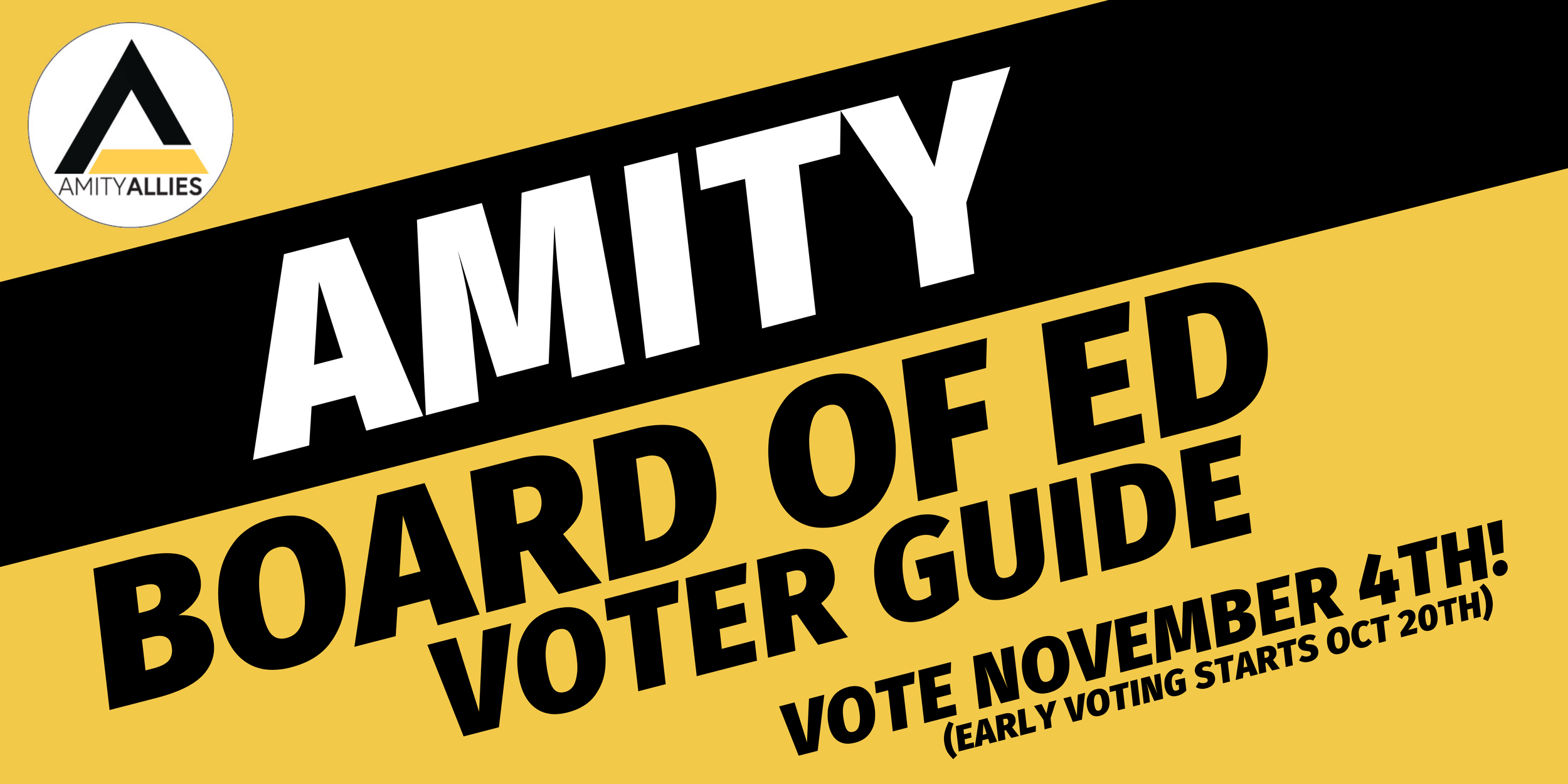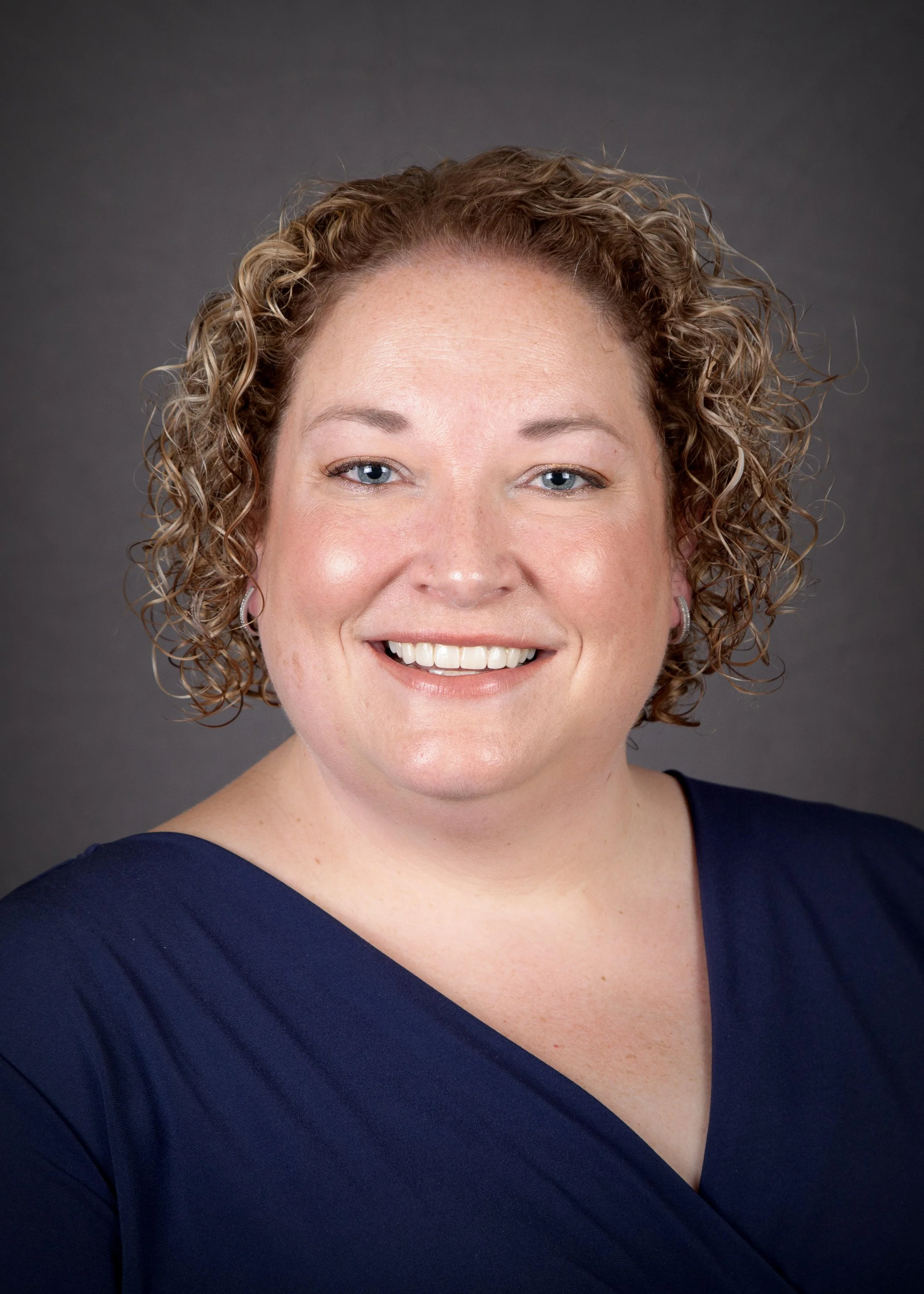Welcome to our Voter Guide!
In short, we invited all candidates for the Amity Board to answer questions relevant to what the Board does. Our goal is to help you, the voter, get to know them better so you can make an informed choice when you vote, whether through early voting (starting October 20th) or on Election Day, November 4th.
If you want the full low down on the voter guide and our process, you can click the banner above to learn more!
Once you’ve learned about this candidate, you can navigate to the next candidate’s page down at the bottom or just click a town seal to see all the candidates running in the town.
Jennifer Blando Jacquet (D) - Orange
“I have dedicated my life to supporting children, education, and mental health. I hope to bring this perspective, along with my knowledge of students’ holistic needs and special education, to the Amity Board of Education. Through my work with the nonprofit SOSA - Safe from Online Sex Abuse, I have also gained a deeper understanding of the challenges students face online and the importance of keeping them safe in a digital world.
I value respectful dialogue, careful listening, and thoughtful research when addressing complex issues. My goal is to work in partnership with the Amity administration and teachers to ensure that every student is supported, challenged, and prepared for success in college, careers, and life. I am committed to fostering an inclusive community where all families feel welcome and where students can achieve their fullest potential.”
The questionnaire:
-
1. What qualifications would you bring as a member of the Amity Board of Education?
I would bring a combination of educational expertise and non-profit leadership experience to the Amity Board of Education. I hold a bachelor’s degree in Special Education and a master’s degree in Music Therapy, and I have extensive experience teaching both groups and individuals in the classroom. This background has given me a deep understanding of diverse learning abilities, neurodivergence, giftedness, mental health, and how these factors impact student learning.
In addition, I bring substantial experience in non-profit management. I served on the board of NAMI Westchester (the National Alliance on Mental Illness) for six years, including two years as President. I currently serve as Director of Development for SOSA, where I present to parents, teachers, students, and mental health professionals on the realities of online exploitation and trafficking. Through these experiences, I have contributed to board governance, budgeting, and strategic planning. I have worked with diverse stakeholders with varying perspectives and have consistently found ways to build consensus in a diplomatic and empathetic manner. These skills allow me to collaborate effectively, prioritize student needs, and support policies that strengthen educational programs and school communities.
-
2. What would you hope to accomplish in the next term as a member of the Board?
As a board member, I hope to strengthen support for all students across the district. My work with issues of sexual exploitation and cyberbullying equips me to contribute to ongoing improvements in student safety, digital behavior policies, and online security measures.
Having navigated the IEP and medical 504 process with my son following an osteosarcoma diagnosis and treatment, I also hope to help strengthen the district’s special education programs. My goal would be to ensure that families and students with special or medical needs receive consistent support, clear communication, and equitable access to educational opportunities.
Additionally, I hope to serve as a representative voice for the LGBTQ+ community. Many discussions about LGBTQ+ issues in schools are theoretical, but real families in Orange live these experiences every day. I want to bring that perspective to the Board, ensuring that LGBTQ+ students and families feel respected, valued, and safe in our schools.
-
3. Do you have any concerns about academics, curricula, or extra curricular opportunities (athletics, clubs, etc) at Amity?
In listening to student representatives at Board meetings, I believe that strengthening the special education program and expanding advanced and college-preparation options are key to keeping the curriculum relevant and meeting the needs of all students. More individualized programming is often necessary, whether a student has a disability, is gifted, or has a particular interest in areas such as STEM or the arts.
Extracurricular opportunities are just as important as the academic curriculum. Every student deserves a place to belong, compete, and develop skills that may not appear in a textbook. While I do not have specific concerns about the current offerings, I will work to ensure they remain accessible, diverse, and expansive. I also see opportunities to enhance extracurricular programs by connecting them with local organizations and businesses. Partnerships like these can provide students with hands-on experiences, mentorship, and a broader sense of community engagement, further enriching their education.
-
4. On what basis do you think the job performance of the Superintendent of Amity Schools should be evaluated?
I believe the performance of the Superintendent of Amity Schools should be evaluated through a balanced approach that includes both measurable outcomes and qualitative feedback. While data such as student achievement, budget management, and progress toward strategic goals are important, they only tell part of the story.
Equally valuable is feedback from those who interact most directly with the superintendent’s leadership—teachers, parents, staff, and community stakeholders. To ensure honesty and safety in the process, it’s essential that teachers are able to provide input anonymously. Their unique perspective can shed light on how district leadership impacts daily classroom experiences and staff morale. Parents who have had direct interactions with the superintendent should also be given the opportunity to share their experiences and offer constructive feedback. Creating a space where all voices can be heard—whether through surveys, forums, or one-on-one input—will help build trust and ensure that evaluations are comprehensive and fair.
Having participated in executive evaluations before, I know the value of combining clear metrics with thoughtful, respectful input from those affected by leadership decisions. This approach supports accountability and continuous improvement, with the ultimate goal of enhancing the educational experience for every student.
-
5. What are the primary criteria you would bring to considering the administration’s annual budget proposals for the Amity district?
When reviewing the administration’s annual budget proposals, I would focus on ensuring both fiscal responsibility and continued educational excellence. Our recent budget surpluses demonstrate that the district is managing funds prudently, while maintaining a buffer that protects against unexpected costs such as insurance increases or economic changes. Preserving this approach is essential to long-term financial stability and community trust.
At the same time, it is vital to recognize that Amity’s strong reputation for academic excellence is central to the success of our students, the desirability of our community, and even the strength of local property values. To maintain this reputation, the district must remain competitive in attracting and retaining exceptional teachers, especially in today’s challenging hiring environment. This means carefully weighing budget increases to ensure they directly support high-quality instruction, student opportunities, and the well-being of our staff.
-
6. How do you view the respective roles of the Board, Amity administration, the State of Connecticut, and the federal government in determining curriculum in the district?
I see curriculum development as a collaborative process shaped at multiple levels. The federal government plays a limited role, largely by setting broad policies and funding priorities that influence state education standards. The State of Connecticut establishes the core standards and expected learning outcomes that all districts must meet, ensuring consistency and equity across the state. We are fortunate that it appears that the State of Connecticut will do everything in its power to offset any funding cuts put forth by the federal government.
The Amity administration and teachers take the lead in translating those standards into practice. They select materials, design instruction, and adapt approaches to meet the diverse needs of our students. Their expertise is essential in making curriculum both rigorous and responsive.
The Board’s role is to review and approve the curriculum, ensuring it aligns with state requirements while also reflecting the values and aspirations of our communities. The Board also serves as an advocate for public education, providing oversight and helping ensure that curriculum decisions truly support student success, individualized needs, and the rigorous educational expectations of our high standards at Amity.
-
7. How would you weigh your responsibility as an elected representative of your town and your duty to support the district as a member of its Board?
I do not see my responsibility to my town and my duty to the district as competing obligations. Both roles ultimately center on doing what is best for students and ensuring our schools remain strong, effective, and responsive to the community. As an elected representative, I would be mindful that I serve the families and taxpayers of my town, and take seriously the trust they place in me. At the same time, as a Board member, my focus would extend to the needs of all students across the district. These perspectives complement each other: strong schools benefit every town, and the success of the district strengthens each community.
I have no agenda beyond helping students reach their full potential and ensuring our schools have the resources and support to make that possible. I am not directed by any political committee or ideology; my decisions are guided by my commitment to public education, fiscal responsibility, and the belief that investing in our schools is an investment in the future of our towns.
-
8. How would you approach making decisions at Amity that may affect parents who also have students at the elementary school(s) in your town, such as those regarding the Amity schools’ calendar or a later start time at the middle and high schools?
Although I currently have one son at AMSO, I know that Amity BOE decisions often affect families with children in all of the schools. It is important to consider the broader impact on all families, especially on issues like the school calendar or start times.
I would approach these decisions by listening carefully to parents, teachers, and administrators, and by weighing the benefits and challenges for students at every level. Collaboration with the Orange Board of Education is also essential, so that both boards can align where possible and avoid creating unnecessary difficulties for families. My priority is to support choices that promote student well-being, academic success, and family stability. By keeping the needs of both Amity schools and the elementary schools in view, and maintaining open communication across boards, we can make thoughtful decisions that strengthen the entire community.
-
9. How would you make sure that everyone - including parents and students - feels welcome in the district, regardless of their political views (conservative, liberal, or moderate), faith, cultural background, race, or how they view themselves?
I believe Amity’s strength lies in its diversity. Our different backgrounds, perspectives, and experiences enrich the educational environment and prepare students to thrive in a complex world. Staff, parents, students, and community members should feel respected and valued, regardless of political views, faith, culture, race, or identity.
As a Board member, I would commit to fostering an environment where all voices are heard, especially those that have historically been marginalized. Listening with respect and seeking common ground helps ensure that families feel welcome and connected to our schools. I see this not only as a responsibility but also as an opportunity for our community to grow stronger together. It is equally important to consistently evaluate our programs and standards to ensure they are meeting the needs of every student. By keeping our focus on providing the best possible education, rooted in respect, inclusivity, and excellence, we can ensure that students succeed and the entire community benefits.
Next Candidate
Christian Young (R)
Christian Young (R)
(click photo to read)




